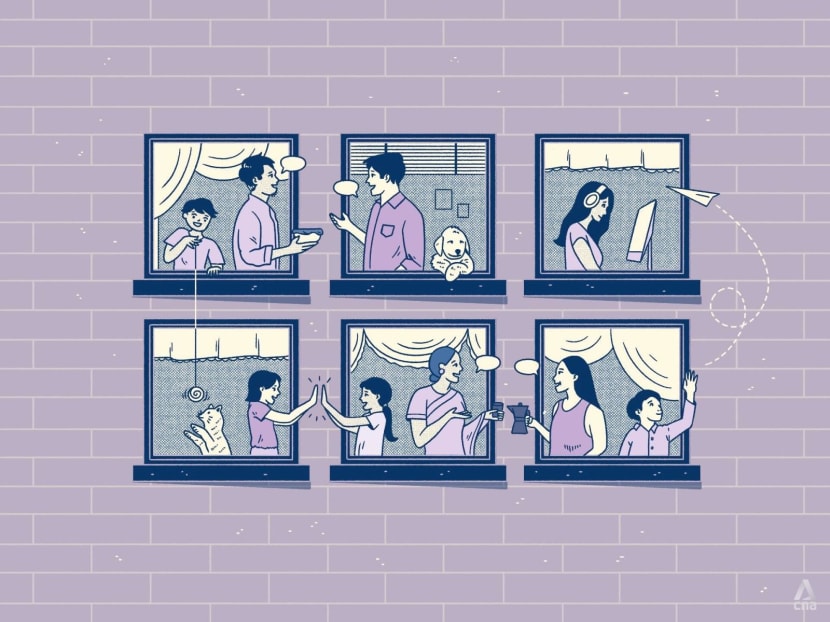Good neighbours: A friendly wave each morning makes for a better day
Forging close relationships with one's neighbours is great but does not guarantee a conflict-free neighbourhood, experts said. Here are ways to befriend the people next door and be good neighbours, even when there is the occasional dispute.

A good neighbour can be one who does not know any personal details about you, but is willing to help you during times of need, a psychotherapist and counsellor said. (Illustration: CNA/Nurjannah Suhaimi)

This audio is generated by an AI tool.
Adulthood is not just one phase of life but comes in stages. Its many facets can be overwhelming, from managing finances and buying a home to achieving work-life balance and maintaining healthy relationships. In this series, CNA TODAY's journalists help readers deal with the many challenges of being an adult and learn something themselves in the process.
When I bought my first home in a new public housing estate about six years ago, I tried to picture what sort of relationship I would have with my neighbours.
As cliched as it may sound, I imagined that we would all be filled with the "kampung spirit", decorate the common corridor together on festive occasions and take turns hosting potluck gatherings in our homes.
Unfortunately, the reality could not have been further from that.
When I moved out of that flat recently, not a single get-together had been organised and no decorative items had ever been put up in our common areas throughout the six years.
Worst of all, I still did not know a single neighbour's name.
To be clear, we were cordial and polite towards each other when we were walking along the common corridor or sharing a lift.
I had no complaints or grievances at all about my neighbours except for one incident towards the end of my days there. More on this later.
The main point is, the interactions were nowhere near as vibrant as I had wished. Instead, they were just limited to courteous smiles and exchanges of greetings.
It made me wonder if I was being a bad neighbour – or at least not a good enough one – for not making the effort to do more to build relationships.
Speaking to some peers, I realised that I was not alone feeling like this.
A friend who moved into her own flat last July said that she, too, would like to form close relationships with her neighbours, but did not find it easy.
She told me about a neighbour who, she believed, would quite conspicuously avoid looking in her direction on the rare occasions that they bumped into each other at the lift lobby.
It made my friend hesitant to greet the woman, because she felt as though it was the neighbour’s way of indicating that she would rather keep to herself.
After such an awkward interaction happened twice, my friend reluctantly dropped the idea of befriending this neighbour.
A survey conducted by the Singapore Kindness Movement last year found that more than four-fifths of respondents encountered various “barriers” in interacting with their neighbours.
The top three challenges indicated were:
- Returning home at different times from the neighbours
- Neighbours keeping their front doors closed
- Not knowing what to say when encountering the neighbours
I related very strongly with all three of these challenges.
Given these obstacles, I wondered how I could start becoming a better neighbour at my new home.
Or perhaps, I should forget about putting in the effort to build neighbourly ties and just be resigned to the typical "hi-byes" again.
EASIER TO BEFRIEND COLLEAGUES THAN NEIGHBOURS
Speaking to some counsellors and experts about this issue, I started by asking why I found it easier to befriend colleagues whom I've known for a much shorter period of time than my neighbours.
For instance, I’ve worked with one particular colleague for fewer than three years, yet I am already on Instagram-messaging terms with her boyfriend, occasionally laughing at each other’s shenanigans online.
In contrast, when it came to my old neighbours of more than five years, I didn't even know their names, let alone their Instagram handles.
Ms Michelle Tay, executive director of the Singapore Kindness Movement, said that it boils down to "the proximity effect".
“When you see certain people often enough and nearby you, you will tend to like them more and are likely to become friends with them, which is sometimes not applicable in the neighbourly context,” Ms Tay explained, referring to the barriers indicated by the survey respondents last year.
She also said that this is why seniors, for example, who spend more time at home, tend to be more familiar with their neighbours than younger family members who spend most of the time at school or at work.
Mr Clifton Tokoara said that at work or school, people are naturally brought together through common activities or responsibilities. This is not the case for neighbours.
The counsellor at Eagles Mediation & Counselling Centre added: “Without this common ground, initiating conversations (with neighbours) can feel awkward.”
Another factor is that after a long day at work or school, some people look forward to retreating into their homes to relax and recharge.
This makes them savour their privacy and they are therefore less inclined to interact with their neighbours, Mr Tokoara said.
So what can we do if we would like to build relationships with our neighbours?
In our enthusiasm to break the ice, the experts said that it is just as important to respect our neighbours' personal boundaries, especially if they have signalled that they are not keen to get too close.
Ms Jean Chen, a psychotherapist and counsellor, said: "Not being respectful of boundaries can cause unhappiness between neighbours. That can be quite unpleasant given that one might possibly have to cross paths with that neighbour on a daily basis."
Ms Chen is director of Relationship Matters, which offers therapy and counselling services to couples and families.
START WITH A SMILE, AND GIVE IT TIME
So what actions can a neighbour take to overcome the barriers to establishing ties?
And what if the neighbour is someone who is like me, who would rather bury his head in the sand than make small talk about the weather?
As a self-described ambivert – a mix of an introvert and extrovert – Ms Tay from the Singapore Kindness Movement said that she could empathise with “the awkwardness of just striking up a conversation with a total stranger”.
However, in a bid to tame that awkwardness, she always tries to remind herself that neighbours are not “total” strangers.
“We have crossed paths – whether it be in the neighbourhood, on the way to work or seeing their children being picked up after school,” she said.
Always start small, without the pressure to take bigger steps than one is comfortable with, the experts advised.
“It can be as simple as keeping your doors open so that you may wave when they pass by or smiling when you see them in the lift,” Ms Tay said.
That way, introverts may still show friendliness without overwhelming themselves.
Most importantly, engage in these friendly gestures consistently, but give it time for them to work their magic.
“Small, repeated gestures – such as offering a friendly smile or engaging in casual conversation – gradually build familiarity and comfort,” Mr Tokoara the counsellor said.
If you would like to start a conversation, Ms Chen the psychotherapist recommended going with more general topics first and keeping away from personal questions, or simply indicating your willingness to lend a helping hand.
"One can offer help without making small talk, such as by saying, 'I see that you have some potted plants, feel free to let me know if you need help in the future to water them while you are away'."
And if you would like to step up your game in interacting with your neighbours, but find no occasion to do so, the experts suggested attending community events such as neighbourhood clean-ups or block parties, which can provide a relaxed setting to interact with people living near you.
BENEFITS OF HAVING FRIENDS NEXT DOOR
It can be rewarding to navigate the initial awkwardness or hesitance to forge a closer relationship with your neighbours.
For one thing, having an existing good relationship and understanding of each other can make it easier to resolve the potential arguments between neighbours, the experts said.
That being said, having a close relationship will not make neighbours immune from conflicts entirely. On rare occasions, such a close bond might have the opposite effect.
“If you are the best of friends with your neighbour, you may feel embarrassed to bring up certain ‘sensitive’ subjects, like loud noise during quiet hours, for fear of ruining the relationship,” Ms Tay said.
That is why in certain circumstances, having an acquaintance-like relationship with neighbours might help to solve disputes better, she added.
Regardless of how tight you are with your neighbours, there are a few basic guidelines that can come in handy when resolving disagreements.
Mr Tokoara said that it is important to first manage our own emotional response when having a conflict with a neighbour.
“When your personal space is threatened, it triggers the amygdala – the part of the brain responsible for detecting threats,” he explained.
“If not managed, this can lead to chronic stress. Breathing exercises and grounding techniques can help regulate these stress responses and prevent prolonged tension.”
When conflicts happen, the experts highlighted the importance of approaching these situations with empathy and to avoid adopting a confrontational tone.
Instead of saying, "Your laundry is blocking the walkway", try saying, "I feel the walkways are cramped with the laundry rack", Mr Tokoara proposed. The latter sounds less like you directly criticising the neighbour and can help create an atmosphere of mutual understanding.
And don’t be afraid to get help either, if you feel that you alone are not making headway in resolving certain tense moments with your neighbour.
I recounted to the experts that towards the end of my time living at my old place, my immediate neighbour’s child developed a habit of smoking with her friends right outside my doorstep.
I told them off politely but firmly each time, yet they persisted. Hoping to not leave the neighbourhood on a bad note, I resorted to just covering the gap under my door with a towel for the last few weeks I was there.
Ms Tay suggested that what could have been done in this situation was to ask other neighbours in the vicinity if the smoke was also affecting them.
“Perhaps after giving others the courage to speak out, a few of you can speak to the neighbour who smokes and show her how it affects not only your household but others’ as well from the standpoint of health and well-being,” she said.
Ms Chen said that if a person starts to rant because he or she is unable to keep the frustration in check when confronting a neighbour, for instance, it may be useful to disengage for a short period and avoid re-triggering the argument.
"When one feels calmer, one can approach the neighbour again to apologise for the rant or offer a peace offering such as a basket of fruits or snacks. That then dissolves the previous unhappy feelings and bring about a friendly relationship again," she added.
And it goes without saying that when arriving at a conclusion to a dispute, always look for solutions that benefit both parties and foster a sense of cooperation.
At the end of the day, in trying to be a good neighbour, one should not be too hung up on wanting to have besties next door, the experts said.
"A good neighbour can be one who doesn’t know any personal details about you, but is willing to help you during times of need such as calling an ambulance for you or offering torches during a blackout," Ms Chen said.
As with my friend’s experience with the look-elsewhere neighbour at the lift lobby, we can do our part to reach out, but our neighbours may have their own reasons to not reciprocate, and it is more important that we respect their boundaries.
“The simple fact that you are trying to be a good neighbour already makes you one,” Ms Tay said.













